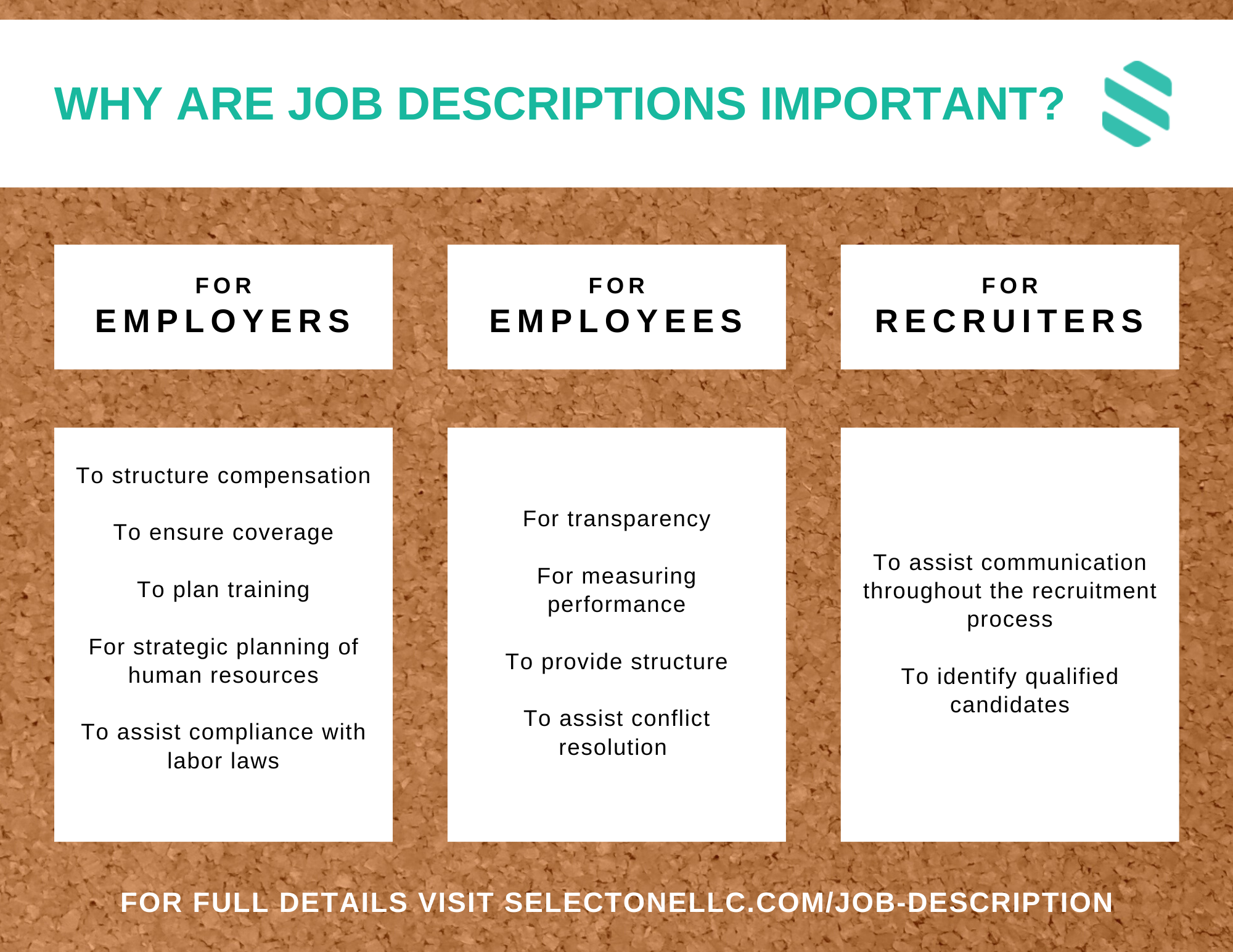Share this
The Importance of Job Descriptions - 12 Points to Consider
by Aly Finkle on Tue, May 19, 2020
The importance of job descriptions is often undermined by business owners' heavy workloads. When you're juggling a wide range of priorities on a daily basis, including putting out the occasional fire, developing job descriptions usually falls to the bottom of the list.
And why bother writing job descriptions for your current employees? Job descriptions are just for recruiting purposes, right?
Wrong. Job descriptions are important for many reasons, and they affect several stakeholders, including employers and employees as well as recruiters.
Here's why it is worth your time to develop complete job descriptions for each of your employees, existing and yet to come.
12 Reasons Why Job Descriptions are Important

For the Employer:
1. Compensation Structure
If done correctly, job descriptions help human resources determine market value of the role in order to avoid pay inequality issues down the road.
2. Coverage
Documented descriptions provide leadership insight to ensure necessary activities, duties and responsibilities are covered by all jobs.
3. Clarity
Job descriptions prevent arbitrary interpretation of a role.
4. Training & Development
Descriptions serve as a reference point for training and development efforts.
5. Strategic Planning
Planning for the business' future is one of the most important responsibilities of a company’s leadership team. Accurate job descriptions allow managers to manage the head count and provide needed insight for succession planning, among other things.
6. Legality
Even though maintaining accurate job descriptions is not a law, it can help organizations stay compliant with other existing employment rules and regulations.
For the Employee, Current or Potential:
7. Transparency
Employees need to know, if not deserve, what they are expected to do and how to do it. Developed job descriptions help to remove uncertainty and provide confidence to employees.
8. Performance Measurement
Job descriptions also serve as neutral and objective reference points for measuring an employee’s performance.
9. Conflict Resolution
In the unfortunate case of an employee/employer dispute, job descriptions are important for solving the issue.
10. Structure
Job descriptions allow the leaders of a company to manage roles in a uniform way.
For Recruiters:
11. Recruitment Process
A clear delineation of roles assist a recruiter and the potential candidates in understanding the role and what is required, ensuring that the selected person can properly commit to the job.
12. Communication
Well-written job descriptions are important communication tools that allow both employees and candidates to clearly understand the essential duties, the required competences, educational credentials, and experience for the role. This will improve internal and external recruitment processes by ensuring that employee expectations are aligned with business expectations of what the role entails.
Dedicating time to writing/re-writing/updating job descriptions may feel like a waste, but it's just not true. Putting effort into developing quality job descriptions benefits numerous stakeholders: the individuals who work everyday to make your company a success.
Editor's Note: Originally published 3/30/15; updated 5/19/20.
Share this
- October 2022 (2)
- September 2022 (1)
- August 2022 (1)
- July 2022 (4)
- June 2022 (3)
- May 2022 (2)
- February 2022 (2)
- May 2020 (2)
- April 2020 (8)
- March 2020 (6)
- February 2020 (4)
- January 2020 (2)
- December 2019 (3)
- November 2019 (2)
- October 2019 (9)
- September 2019 (6)
- May 2019 (4)
- April 2019 (9)
- March 2019 (7)
- February 2019 (10)
- January 2019 (4)
- December 2018 (12)
- November 2018 (6)
- October 2018 (4)
- September 2018 (6)
- August 2018 (14)
- July 2018 (8)
- June 2018 (7)
- April 2017 (1)
- February 2017 (5)
- January 2017 (8)
- December 2016 (8)
- November 2016 (3)
- October 2016 (7)
- September 2016 (8)
- August 2016 (7)
- July 2016 (6)
- June 2016 (9)
- May 2016 (7)
- April 2016 (9)
- March 2016 (8)
- February 2016 (6)
- January 2016 (8)
- December 2015 (7)
- November 2015 (7)
- October 2015 (7)
- September 2015 (8)
- August 2015 (11)
- July 2015 (8)
- June 2015 (4)
- May 2015 (5)
- April 2015 (4)
- March 2015 (4)
- February 2015 (7)
- January 2015 (8)
- December 2014 (5)
- November 2014 (2)



Comments (1)